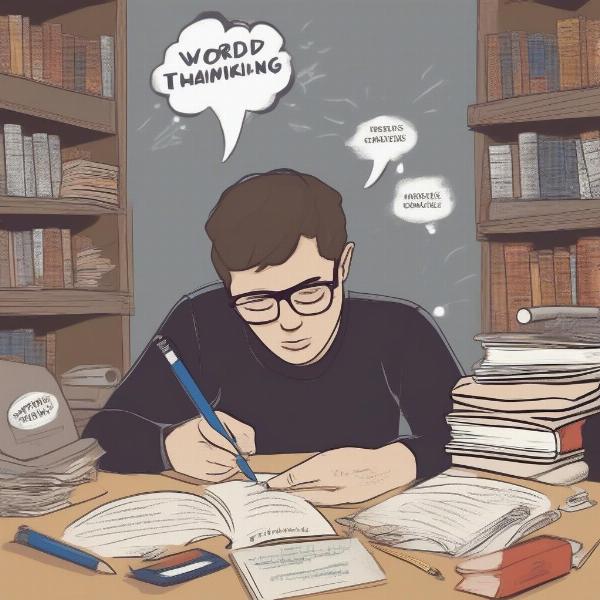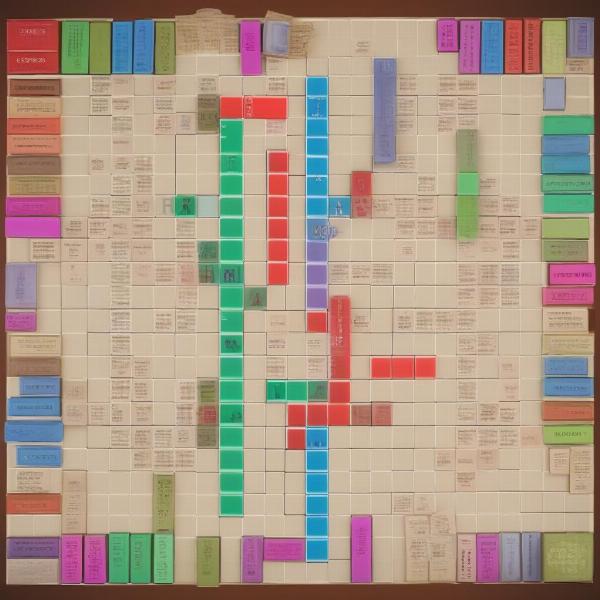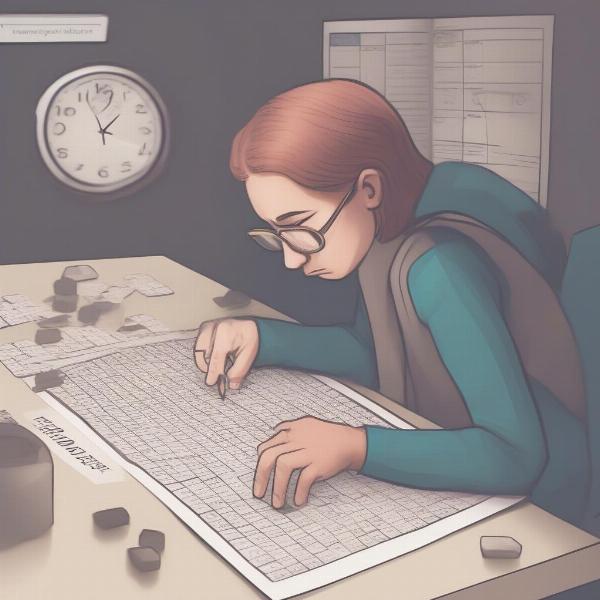Word games offer a fantastic way to sharpen your mind, expand your vocabulary, and simply have fun. Whether you’re a Scrabble aficionado, a Wordle enthusiast, or a crossword puzzle devotee, there’s a word game out there for everyone. But how do you go from casual player to word wizard? This comprehensive guide will delve into effective strategies and techniques to help you significantly improve your word game skills.
Similar to how understanding the rules of chess can elevate your game, learning effective strategies for word games can dramatically improve your performance. This article provides actionable steps to enhance your vocabulary, improve pattern recognition, and develop strategic thinking, ultimately helping you get better at word games. For those interested in the intricacies of game passwords, you can learn more through this article: how to play the game password.
Expanding Your Vocabulary: The Foundation of Word Game Success
A rich vocabulary is the bedrock of any word game prowess. The more words you know, the more options you have at your disposal. But simply memorizing a dictionary isn’t the most effective approach. Instead, focus on targeted learning.
- Read Widely and Diversely: Immerse yourself in different genres, from classic literature to contemporary articles. Pay attention to unfamiliar words and look up their meanings and usage.
- Use a Thesaurus: A thesaurus is your best friend when it comes to expanding your vocabulary. It not only helps you find synonyms but also exposes you to related words and concepts.
- Learn Root Words, Prefixes, and Suffixes: Understanding the building blocks of words can help you decipher unfamiliar terms and expand your vocabulary exponentially. For example, knowing the prefix “pre-” (meaning “before”) can help you understand words like “prefix,” “preview,” and “premonition.”
- Play Word Games Regularly: The more you play, the more words you’ll encounter and learn. It’s a positive feedback loop!
Mastering Word Game Strategies: Beyond Vocabulary
While a strong vocabulary is essential, effective strategies can significantly boost your performance. Here are some key strategies to consider:
- Focus on High-Scoring Letters: In games like Scrabble, certain letters like “Q,” “Z,” and “X” carry higher point values. Strategically utilize these letters to maximize your score.
- Look for Common Prefixes and Suffixes: Quickly scanning for prefixes and suffixes like “-ing,” “-ed,” “-er,” “re-,” and “un-” can help you identify potential words.
- Consider Word Placement: In games like Scrabble and Boggle, the placement of your words can significantly impact your score. Look for opportunities to create multiple words with a single play.
- Practice Anagrams: Anagrams, words formed by rearranging the letters of another word, are a common feature in many word games. Practicing anagram solving can improve your ability to quickly identify potential words. Like decoding a secret message, mastering anagrams can unlock hidden words and give you a competitive edge.
 Building Vocabulary and Strategy for Word Games
Building Vocabulary and Strategy for Word Games
Specific Game Techniques: Tailoring Your Approach
Different word games require different approaches. Here are some game-specific tips:
Scrabble
- Learn the two-letter words. These can be incredibly useful for squeezing in plays and maximizing your score.
- Practice board vision. The ability to quickly scan the board and identify potential plays is crucial in Scrabble.
- Manage your rack. Keep a balance of vowels and consonants and try to avoid getting stuck with difficult-to-play letters.
Wordle
- Start with a word that contains common vowels and consonants, such as “ADIEU” or “ORATE.”
- Use subsequent guesses to strategically eliminate letters and narrow down the possibilities.
- Pay attention to the color-coded feedback to guide your future guesses.
Crossword Puzzles
- Start with the clues you’re most confident about. This can help you get a foothold in the puzzle and fill in surrounding letters.
- Look for fill-in-the-blank clues. These are often easier to solve and can provide valuable crossing letters.
- Don’t be afraid to use a pencil and eraser. Crossword puzzles often involve trial and error.
Logic games, like those found on the LSAT, can also enhance your word game skills. For insights into these games, check out our guide on how to do lsat logic games.
 Tips for Scrabble, Wordle, and Crossword Puzzles
Tips for Scrabble, Wordle, and Crossword Puzzles
The Psychology of Word Games: Staying Sharp
Beyond vocabulary and strategy, the mental game plays a crucial role in word game success.
- Stay Focused: Minimize distractions and concentrate on the game at hand.
- Be Patient: Don’t get discouraged if you don’t immediately see the solution. Sometimes, stepping away for a moment and returning with fresh eyes can make all the difference.
- Practice Regularly: Consistent practice is key to improving your skills and maintaining mental sharpness.
“Consistency is key in any skill development, especially word games,” says Dr. Anya Sharma, a cognitive psychologist specializing in language acquisition. “Regular engagement strengthens neural pathways associated with language processing, leading to improved vocabulary recall and pattern recognition.”
 Mental Focus, Patience, and Practice in Word Games
Mental Focus, Patience, and Practice in Word Games
Expanding Your Word Game Horizons: Exploring New Challenges
Once you’ve honed your skills in your favorite word games, consider branching out and exploring new challenges. Try different game formats, participate in online tournaments, or even create your own word puzzles.
Conclusion: The Journey to Word Game Mastery
Getting better at word games is a journey, not a destination. By consistently expanding your vocabulary, mastering effective strategies, and nurturing a positive mental approach, you can unlock your full word game potential and achieve new levels of success. So, keep playing, keep learning, and most importantly, have fun! How have these tips helped you improve your word game skills? Share your experiences in the comments below!
FAQs
- What are some good word games for beginners? Wordle and simple crossword puzzles are great starting points for beginners.
- How can I improve my vocabulary quickly? Focus on learning root words, prefixes, and suffixes, and read widely.
- What are some common Scrabble strategies? Focus on high-scoring letters, two-letter words, and board vision.
- How can I get better at anagrams? Practice regularly and look for common letter combinations.
- What is the best way to approach crossword puzzles? Start with the clues you’re most confident about and look for fill-in-the-blank clues.
- How can I stay focused during word games? Minimize distractions and take breaks when needed.
- Are there any online resources for word game practice? Yes, there are many websites and apps that offer word game practice and tutorials. Do you find yourself wondering if you’re interacting with a human or a bot in some of these online games? We explore this fascinating topic further in our article: am i talking to a human or not game. Ensuring you are dealing with a legitimate company is also vital. You can check out our advice on is the video game company legit.

